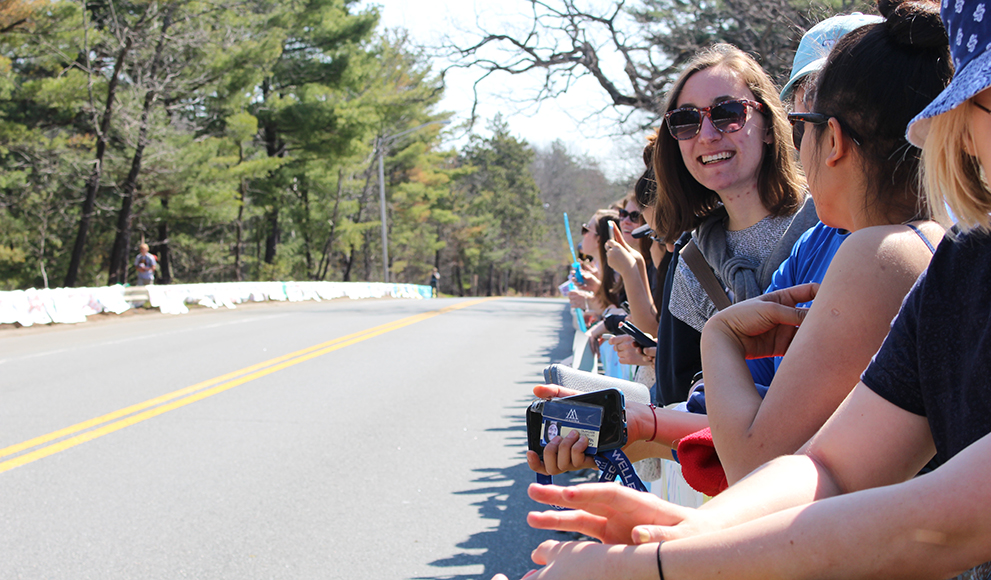Senior Pens a Reflection on the Meaning of the Scream Tunnel, the Marathon, and Bobbi Gibb

Wellesley students have gathered to support and cheer on runners since the very first Marathon. The support continued to grow each year and eventually became the much-loved tradition now known as the Scream Tunnel. Students make signs, cheer, and give high fives (and, yes, sometimes kisses, too) to motivate runners.
Although the ritual is known to have gained momentum in the 1970s when women were finally allowed to officially run the race, students were there in force in 1966 to support Roberta Louise "Bobbi" Gibb, the first woman to run the Boston Marathon. Gibb described their support in a recent interview with Women's Running magazine.
Gibb recorded that first Boston Marathon finish at a time when the prevailing wisdom was that a marathon distance, 26.2 miles, would likely be deadly for a female. She would return to run again in 1967 and 1968. Gibb challenged the rules and, ultimately helped to change them, and she inspired generations of women.
In honor of the 50th anniversary of Gibb’s history-making marathon finish, Laura Brindley '16 reflected on the meaning Bobbi Gibb, the Scream Tunnel, and competition have for her as a senior. Her reflection follows:
This year the Boston Marathon holds special meaning for me. As a senior, it’s my last chance to cheer in the "Scream Tunnel." This year is also the 50th anniversary of Bobbi Gibb's historic run as the first woman runner, among hundreds of men, in the 1966 Boston Marathon. As the day approaches, I've been reflecting on my four years at an all-women’s college as well as what Gibb's story means to me.
As a Wellesley track and field and cross country athlete, I think Gibb's trailblazing 1966 Boston Marathon run shows the true meaning of breaking a glass ceiling in sports and truly epitomizes what it means to be a "woman who will," our unofficial Wellesley motto that means women who don’t abide by others' constraints. Not only did Gibb qualify for the Marathon by today's incredibly competitive requirements, she finished the Marathon in 3 hours and 21 minutes, 13 minutes faster than today’s qualifying standards for the women's 18-34 age group. Her feat is inspiring.
Another part of her story resonates even more with me---her memories of running through Wellesley's famous Wellesley Scream Tunnel at the halfway point of the Boston Marathon. (This is the famous spot on the route where Wellesley students cheer for the passing runners. It's a boost of adrenaline for runners and a rush even for us when we receive kisses.) Here's how Gibb described the positive energy that she received:
When I got to Wellesley College, I could hear these screams in the distance … When the women saw me they screamed and screeched. One woman…was shouting, ‘Ave Maria!’ I really felt as though this was freeing women, that there was a whole new horizon opening up.
Of course, I can only imagine the euphoria on the Wellesley campus that Monday in 1966 after witnessing the first woman to ever run the Boston Marathon pass by. Gibb’s story is the perfect example of women supporting each other in endeavors to break the glass ceiling. It's a lesson I'll take with me as a graduate.
The race itself holds another lesson, this one about competition and supporting your fellow runner. Even though women have faced adversity for attempting to "play with the boys" in other sports, Gibb has described her experience of sneaking into the race as positive, that "the men loved the fact that I was running. They were very protective and encouraging." Unlike other sports, we compete in order to best our own previous performances, not necessarily to defeat an opponent. Having the support of fellow athletes --and screaming spectators--helps even the steepest hill seem manageable.
Every year when I cheer in the Scream Tunnel and watch the determination and struggle visible on every face, I think about my own limits. Although I have never run a marathon, I do know that the hours that it takes to train in order to simply finish a marathon are astounding. In order to run a fast 5k in cross-country, for example, it is necessary to do a mix of speed, hill, and distance workouts. But qualifying for and running the Boston Marathon requires much longer workouts and necessitates longer recovery time, not to mention you must meet the qualifying standards and to maintain the fitness required to run more than one marathon in one or two years. The culture at Wellesley is about pushing past your limits, so I hope to one day be able to run far and fast enough to qualify for the Boston Marathon and join the thousands of woman runners who have ran it before me, including Bobbi Gibb.
For me, this year's 50-year anniversary of Bobbi Gibb’s shows how the support of fellow runners and spectators is capable of helping minimize the gender gap and bringing a community of thousands of students, runners, and Bostonians together. But what it really comes down to is this: When you hit the infamous 18-mile wall either in a race or in life, you turn to your friends, your community, even your fellow competitors. For me, the connections and relationships I've built in the past four years at Wellesley, as well as the support from fellow runners, have made anything seem attainable.
